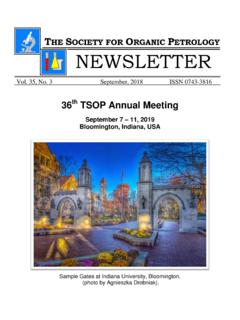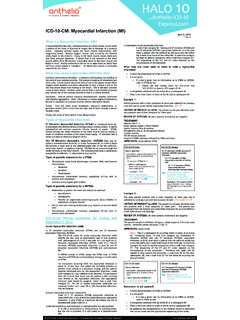Transcription of AMS Newsletter, issue 1, May 19, 2015 - sam-ptf.com
1 ams newsletter , issue 1, may 19 , 2015. Words of the president of AMS. The African Membrane Society is the result of discussions initiated in August 2010 in Bamako at a workshop of the Mali Symposium on Applied Sciences. Experts on water and membrane technologies present at the meeting had then expressed the wish to create a continental structure able to meet the following expectations: form a critical mass of African experts in the field of membrane filtration, water treatment and renewable energy;. have a pan-African network where all continental cultures can discuss scientific and technological issues;. engage close partnerships with global elites in the field of filtration;. encourage the emergence of AMS as a scientific society; and promote partnership with the industry sector.
2 AMS virtual network was created in 2011 which comprised about thirty members from West Africa, North Africa and some members in North America. After the launching of a virtual platform, this group has appointed an interim executive body that continued to operate between 2012 and 2014. AMS was officially created in August 2014 during a second international meeting in Bamako, and is headquartered at the National School of Engineers AB Tour of Bamako. Today, the association staff has doubled (65 members) and the website of the AMS counts more than 2,700 visitors. AMS advocates for the study and exploitation of filtration processes focused on Water, Health, Energy and Environment. In the area of water treatment, filtration units have several technological advantages for Africa (modularity and robustness of systems, consistency in water cleanliness, relative ease of use, etc.)
3 And capital and operational costs tend to trend toward those of conventional platforms. The priority and the challenges for the AMS are to stimulate technological appropriation via the formation of a critical mass of experts and dissemination of scientific knowledge. An encouraging sign of our time is that African States seem to have incorporated the need to mobilize and share priority resources of the continent to address transnational threats posed by armed conflicts, food crises, drought and epidemic risks. AMS welcomes these initiatives and believes that its success is closely tied to active mobilization of African policymakers. We will assuredly seek their support to help the best research centers of the continent sharing their skills with those who may benefit from them.
4 We believe that doctoral students and young African professionals have an essential role to play in the consolidation, or even normalization, of these inter-state exchanges. It is in this light that we maintain close ties with the younger members of the AMS and provide them with various services such as mentoring programs, invitations to meetings of the Board, travel grants, awards for the best scientific contributions, and a section for young talent in the newsletter . We believe that the development of partnerships in the filtration area outside of Africa is also essential. Our association has close ties with the Chair of the UNESCO-SIMEV (Science & Membranes for the Environment), the European Membrane Society, the European Membrane Institute, the Third World Academy of Science, the Agence Universitaire de la Francophonie, and the California Institute of Technology.
5 Their support has encouraged the emergence of AMS; we are very grateful to them. On the other hand, we regularly exchange with the Aseanian Membrane Society and the North American Membrane Society to strengthen academic and industrial partnerships. Therefore, AMS seeks to respond to major development issues in the African countries by promoting the use of membrane filtration in key areas such as water, health and the environment. In addition to providing 1/8. ams newsletter , issue 1, 2015. technological and scientific knowledge, it aims at networking all stakeholders, including policy makers, industry and the population according to various ways of disseminating information and consultation (website, newsletters, regular international meetings and symposia, etc.)
6 Regarding the policymakers of African countries, their mobilization is essential for integrating these concerns into local policies. Strengthening and enhancement of local skills through greater involvement of young PhD. students and professionals is also a very important challenge that AMS wants to tackle. Finally, critical mass and visibility provided by the established wide network, participating in funding opportunities of pilot actions, and even more ambitious internationally involved future projects (including participation in competitive international calls). For short-term goals, here is the list of 2015 and 2016 priorities that AMS has set: preparation of the next international meeting of the AMS in Sfax (Tunisia) in spring 2016.
7 Publication of a thrice-yearly AMS newsletters ;. publication of an introductory membrane textbook on water treatment by African users;. updating the AMS website;. posting a database of African experts on filtration, membrane systems and water management. This newsletter aims to providing greater visibility to AMS activities (members, resources, projects, etc.), to present current projects on the promotion of filtration processes in Africa, and to integrate contributions of our esteemed partners. Abdoulaye DOUCOURE. We hope you enjoy reading the first issue ! AMS News AMS is a scientific association, of public interest, not for profit, not accepting any form of discrimination within it. It is headquartered at the National School of Engineers Abderrahmane Baba Toure in permanence at its headquarter is assured by Professor Arona Coulibaly with whom you can communicate directly by e-mail: Announcement Section One of AMS flagship projects in the near future is the publication of a textbook on membrane technologies for undergraduate engineering students.
8 To this end, AMS is calling for contributions from experts in the field of membranes, regardless of nationality, interested in participating to write a chapter of this book to contact one of the editorial board members through the following emails: Sidy BA ;. Alexander ANIM-MENSAH ;. Mady CISSE ;. Abdoulaye DOUCOURE As part of its mission to promote membrane technologies, AMS will hold its next biennial conference in Tunisia. The event will be organized by Prof. Raja Ben Amar and her team at the University of Sfax, during the spring of 2016. An official announcement will follow soon. Stay tuned! The North American Membrane Society (NAMS) will hold its 25th annual meeting on membranes from May 30 to June 3, 2015 in Boston, MA, USA.
9 During this scientific conference, AMS will be represented by some of its board members who will give presentations and talk about AMS. 2/8. ams newsletter , issue 1, 2015. Membrane & Filtration Research in Africa Competitiveness of membrane technology in water treatment has greatly increased over the last decade. This is in large part due to the efficiency of this treatment process in removing small contaminants that often escape conventional methods, not requiring use of chemicals, and its relatively affordable energy consumption. Given these advantages, membrane technologies are essential in the coming years to meet the demand for ever increasing diverse water needs. Thus, membrane technology dissemination initiatives are underway in Africa despite the fact that the cost of energy remains high in the continent compared to many other parts of the world.
10 Indeed, a successful partnership between the National School of Engineers Abderrahmane Baba Tour . (ENI-ABT) in Bamako, the Faculty of Science and Technology (FAST), Energie du Mali (EDM SA: the national energy company in charge of producing and distributing drinking water), PALL France and The Academy of Sciences for the Developing World (TWAS) has enabled a project for the treatment of surface water by a membrane technique. This study was conducted on a Pall microfiltration Aria AX2 unit and aimed to benchmark the efficacy of water treatment between this pilot and the current conventional system. The study was successfully conducted as part of a Master's thesis by Souleymane SOW. The results demonstrated predictable higher performance to reduce turbidity by the membrane technology; more surprisingly, less energy consumption per cubic meter of drinking water produced.





